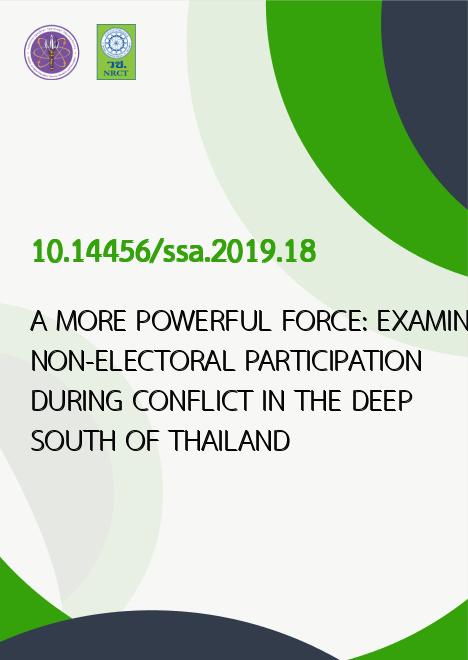
|
A MORE POWERFUL FORCE: EXAMINING NON-ELECTORAL PARTICIPATION DURING CONFLICT IN THE DEEP SOUTH OF THAILAND |
|---|---|
| รหัสดีโอไอ | |
| Creator | Thanikun Chantra |
| Title | A MORE POWERFUL FORCE: EXAMINING NON-ELECTORAL PARTICIPATION DURING CONFLICT IN THE DEEP SOUTH OF THAILAND |
| Publisher | National Research Council of Thailand |
| Publication Year | 2562 |
| Journal Title | SOCIAL SCIENCE ASIA : Official Journal of National Research Council of Thailand in Conjunction with the College of Local Administration, Khon Kaen University |
| Journal Vol. | 5 |
| Journal No. | 3 |
| Page no. | 38-54 |
| Keyword | non-electoral participation, peace and conflict, political participation, southern Thailand |
| URL Website | http://e-journal.nrct.go.th/ |
| Website title | e-journal |
| ISSN | 2229-2608 |
| Abstract | The conflict areas in the southernmost provinces of Thailand--Yala, Pattani, Narathiwat, and four districts of Songkhla have a long history of resistance to the authority of the Thai central government. When most people think of 'conflict', they tend to imagine a confrontation that ends with violence. Interestingly, in spite of the ongoing attacks, the local people in the conflict areas of southern Thailand do not disregard political participation. The conflict and violence act as a trigger that stimulates people's motivations to participate through non-violent means, largely due to experiencing violence and suffering. Therefore, due to concerns for the importance of political participation in the conflict area, this article would like to examine how the ongoing conflict impacts on non-electoral participation. Based on fieldwork in the Deep South of Thailand and interviews with both governmental and nongovernmental actors, as well as university students and lecturers, this article found that conflict and non-electoral participation can be linked in a positive way, in which conflict and violence lead to a greater desire for meaningful political participation; and when people participate, it leads to less violence. This article also emphasizes that when non-electoral participation is interrupted by either the Thai state or the militants, it could cause hesitation to participate nonviolently, which possibly contributes to more conflict and violent participation by people in the conflict area. The experiences of conflict and violence, instead of leading only to violent actions, also motivate people to be more active in politics through peaceful means as they seek to reduce suffering from the insurgent violence. While people in the conflict areas seem to have a significant increase in electoral participation which is a low-level of participation, nonelectoral participation, which is a higher-level of participation, seems to have a more mixed outcome. Three modes of non-electoral participation, namely participation through the state, participation through civil society, and participation through cyber society are discussed in this article. |